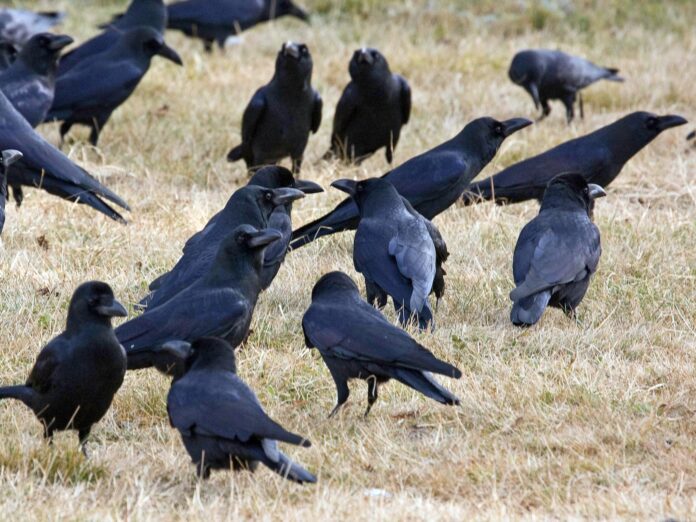Last Updated on November 11, 2023 by Fumipets
Animals like crows are intriguing. While in the air, they are stunning, but they also have a tendency to seem menacing. Since many years ago, crows have appeared in thriller and horror films. Crows have even been known to attack people who seem to be acting normally. There is no need to be terrified of crows since human assaults are uncommon. You should be worried about the crows that you can’t see.
Whether they pose a danger or not, a large group of crows congregating together at one time may be at least somewhat alarming. Crows flock in great numbers for what reason? Is there a deeper purpose behind it, or is it only meant to terrify us humans? In fact, there are a lot of explanations for why crows could congregate in huge numbers. What you need to know is as follows.
The 5 Reasons Why Crows Gather in Large Numbers

1. They Are Roosting
To roost is one of the main why crows congregate in huge numbers. The act of sleeping, or roosting, often takes place after the sun has set. A bird likes to sleep at this time without worrying about predators or other threats. Crows like to roost in big groups because doing so helps them feel safer.
The likelihood of seeing a danger is maximized when several crows are collected. Crows that are roosting often perch on the tops of trees, far from human sight. To let other crows know where they are, they could caw for a time before beginning to rest. At any one moment, some roosting packs may include dozens, hundreds, or even thousands of crows.
2. They Are Grieving
Given that crows are clever animals, it should not come as a surprise that they congregate in huge numbers when one of them passes away. These creatures allegedly do this to gauge the level of danger around, according to researchers. Even worse, some experts have shown that crows sometimes indulge in necrophilia with their deceased. When the birds cluster around a deceased flock member, it may seem as if they are in mourning, but the birds are probably more worried about their safety than anything else.
3. They Sense Danger
Crows may congregate in huge groups when danger is present, which is another explanation. When a predator is nearby, crows may cry out to one another to help them locate one another and form a group. By doing this, they make themselves less appealing to predators and improve their chances of fending them off. Any potential predators may be driven away by a large group of crows making noise in the vicinity.

4. They Need to Get Warm
Depending on the time of year, crows may get chilly just like any other animal. They band together to increase their level of comfort as the weather outside becomes frigid. Most of the time, they stand close to one another. Depending on where they are congregating, they may sit in rows or close to one another.
5. They Are Traveling Together
It seems reasonable that crows would take rests together because they like traveling in groups. A flock of crows may suddenly decide to spend a few minutes perched on a power wire or in a tree before taking off in unison once again. They most likely needed to relax or orient themselves before continuing since they were heading to a remote location. Traveling is one of the less frequent causes of crow aggregation since crows can cover great distances without stopping to rest.
Conclusion
Crows are very intelligent and can identify human faces. If we treat them badly, they may even harbor resentment and gossip about us to other flock members. Therefore, it is not strange that they would congregate in huge numbers for a variety of reasons. However, the motivations for their reunions might be unexpected, particularly when it comes to how they cope with their deceased. Have you recently seen any crows congregating in big groups? If so, were there any hints as to why the behavior was occurring?


















